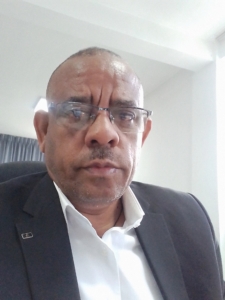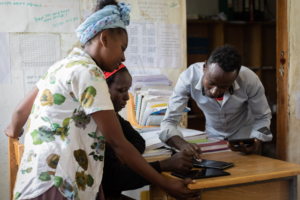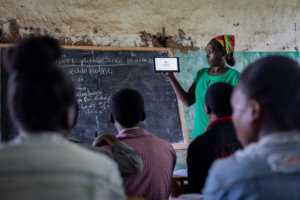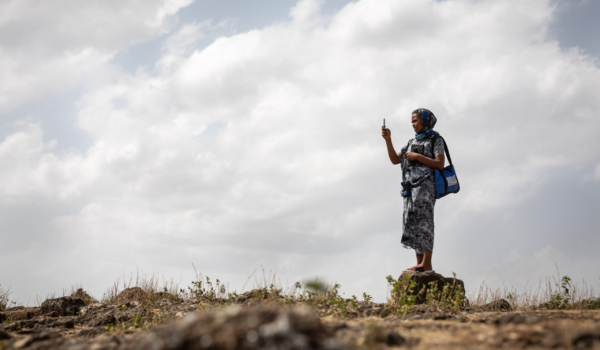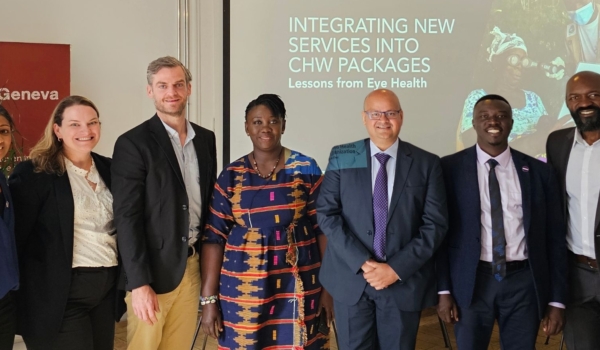Informed by the success of a pilot program developed in partnership with Last Mile Health, Ethiopia’s Ministry of Health has marked an important milestone in improving training for its community health workforce. As of June 2023, the Ministry has formally adopted the blended learning approach into the country’s Health Extension Program. Ultimately, all 40,000 of Ethiopia’s community health workers (known nationally as health extension workers) will receive training using this effective, cost-effective approach.
“In previous years, only face-to-face training was provided to improve the skills of health extension workers,” explains Melaku Yilma, Chief Public Health Professional Specialist with the Ministry of Health. “As a result, providing on-the-job training to 40,000 health extension workers every season was too expensive and continuous training was not possible.”
An innovative solution to this challenge, blended training combines digital and in-person training elements to reduce travel costs and make training interactive, accessible, and effective. The pilot module—in reproductive, maternal, newborn, and child health—demonstrated strong skills and knowledge gains for participants while reducing costs from $605 to $372 per learner. This module is now being scaled across additional regions, with over 3,000 community health workers having completed the training as of June 2023. A second module, in major communicable and non-communicable diseases, is in development with an anticipated launch in 2024 through continued partnership between the Ministry and Last Mile Health.
“Providing on-the-job training based on the training needs of health extension workers will refresh their skills, enhance their competence, and enable them to provide quality and effective community based health services,” says Melaku Yilma. “It will also help them improve for future career and vocational education. The blended training approach is capable of providing on-the-job training to all health extension workers in the country.”
Background
Through its cadre of over 40,000 community health workers, Ethiopia’s flagship Health Extension Program provides primary care to patients across Africa’s second-largest country. These community health workers deliver a standardized, comprehensive package of essential primary care services to their neighbors in Ethiopia’s most hard-to-reach communities. To keep their skills and knowledge sharp, they receive regular in-service refresher training—and the Ministry of Health identified the cost and effectiveness of previous in-person, paper-based training methods as a challenge.
Together, the Ministry and Last Mile Health developed and piloted a new integrated refresher training module using the blended learning approach. The new module includes interactive assessments, additional languages and gender mainstreaming, and multimedia tools to improve learner engagement and effectiveness—and it reduces the number of days learners spend at training sites, thus reducing costs.
“In blended training the majority of training topics are covered through self-learning, so it allows them to attend at a convenient time and place,” explains Melaku Yilma. “The training module is installed on their tablet so they can use it as an on-the-job reference beyond training. This allows you to maintain the quality of the basic health services they provide.”
In response to the demonstrated effectiveness and cost-effectiveness of the blended learning approach, the Ministry of Health has formally adopted this approach into its training for community health workers.
What’s Next
As the Ministry marks this milestone, the next steps toward improving training are already in progress. Together, the Ministry and Last Mile Health will develop blended trainings for every community health worker training topic, and the Ministry ultimately aims to scale these modules to the full workforce of 40,000. The modules will be regularly revised and improved based on newly gathered data from training assessments and surveys.
Overall, the formal integration of blended learning into Ethiopia’s training for community health workers represents a new starting point. “A standardized integrated refresher training is the best pathway to enhance health extension professionals’ knowledge, attitude, and skills. Therefore, it helps to create a system whereby training is linked to performance, so that the providers would be able to provide quality services to their clients,” explains Israel Ataro, Lead Executive Officer for Community Engagement and Primary Health Care. “Now, a digitalized blended learning approach has been a proven approach in order to provide effective, efficient, and quality training.”

